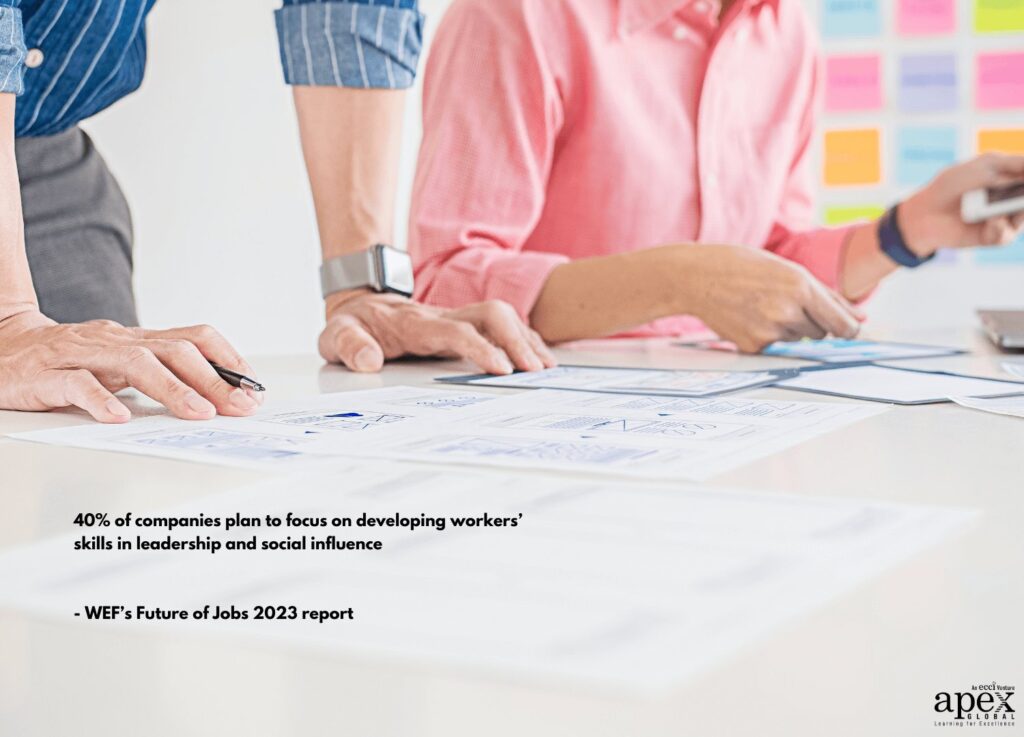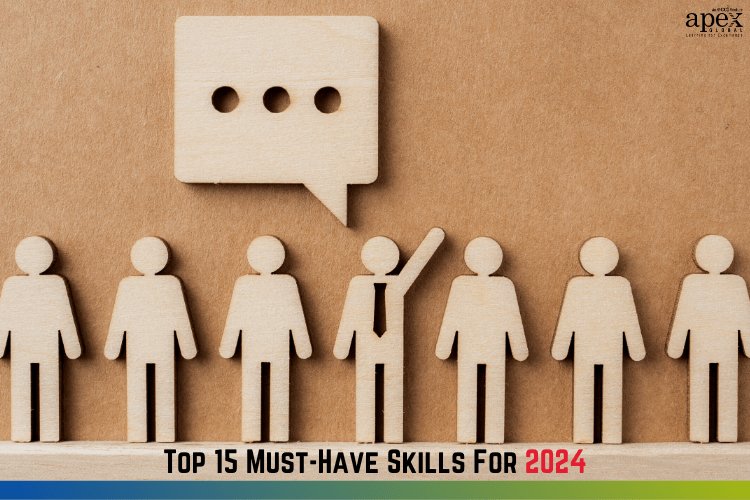The world of work is changing – and certain jobs are changing quicker than others. Soon, we will only be as good as the skills we possess. But which skills are they, and how do we ensure that we keep pace?
The World Economic Forum (WEF) has predicted a valuable list of core skills for workers and skills on the rise – in its Future of Jobs 2023 report. This report explores how the demand for jobs and skills will grow and evolve over the next five years while analyzing employer expectations.
When the Future of Jobs Report was first published in 2016, surveyed businesses predicted that 35% of workers’ skills would be disrupted in the following five years. Today, that share has risen to 44% because technology is moving faster than organizations can design and scale up their training programs.
Considering this, our team of experts at APEX Global Learning has curated a list of 15 top skills relevant for 2024 and beyond among the 26 core skills identified by WEF.
In this article, we’ll explore those 15 top skills that will be essential for both workers and employers to navigate this evolving landscape successfully.
Ready to dive in? Let’s go!
What you'll find in this article [hide]
- 1 1. Analytical thinking
- 2 2. Creative thinking
- 3 3. Resilience, flexibility, and agility
- 4 4. Motivation and self-awareness
- 5 5. Curiosity and lifelong learning
- 6 6. Technological literacy
- 7 7. Dependability and attention to detail
- 8 8. Empathy and active listening
- 9 9. Leadership and social influence
- 10 10. Talent management
- 11 11. Service orientation and customer service
- 12 12. Resource management and operations
- 13 13. AI and big data
- 14 14. Quality control
- 15 15. Networks and cybersecurity
- 16 Final thoughts
1. Analytical thinking
Analytical thinking tops our list of skills that are deemed to be of the greatest importance for professionals in 2024. According to WEF’s report, it makes up a significant percentage of the core skills reported by companies on average.
As businesses across industries increasingly rely on data to make informed decisions, they need more employees who can organize, analyze, and visualize information to draw meaningful insights from it and inspire effective change.
At the heart of analytical thinking lies the ability to break down complex problems faced by organizations into smaller, more manageable parts. The goal is to examine those parts in detail to identify root causes, gain a deeper understanding of the whole, and devise effective solutions based on facts.
Companies need new strategic visions in order to thrive as digital enterprises and analytical thinkers can help them get there.
2. Creative thinking
Creative thinking will be one of the most sought-after skills in the future workplace, especially as we hand more and more routine tasks over to machines.
Businesses surveyed for WEF’s report believe demand for creative thinking will grow faster between now and 2028 – by 73% – than demand for analytical thinking.
People with creative thinking skills can approach problems from new angles and discover unconventional solutions. This skill proves especially beneficial when dealing with complex, ambiguous, or unique challenges.
Entrepreneurs rely on creative thinking to identify opportunities, envision new business models, and create unique value propositions. Startups and small businesses often thrive on creative approaches.
With this in mind, employers will revere those potential candidates who can hone this skill and facilitate the need for adaptability as the future of working evolves.

3. Resilience, flexibility, and agility
Resilience, flexibility, and agility skills come third, ahead of motivation and self-awareness, for workers and employers wanting to stay ahead of the change curve.
In the rapidly changing business environment of today, the ability to adapt and recover swiftly from setbacks is crucial. Resilience, flexibility, and agility enable individuals to thrive in dynamic environments, embrace change, and quickly adjust their approaches.
These skills empower professionals to navigate uncertainties, overcome challenges, and seize new opportunities.
Automation and AI will alter job roles and industry dynamics. People with these skills can more effectively transition to new roles or adapt their current positions to work alongside AI technologies.
4. Motivation and self-awareness
Motivation and self-awareness also ranks high on the list of skills predicted to grow in importance for workers over the next five years.
Today’s competitive job market demands motivated professionals who can continuously improve their skills and adapt to evolving job requirements. Motivation drives individuals to stay focused on their goals and overcome obstacles, promoting productivity and resilience.
With the rise of remote work and digital collaboration, self-motivation is key to maintaining productivity and staying connected in virtual work environments.
Self-awareness helps people recognize their strengths and weaknesses, enabling them to make informed decisions about personal and professional development, set realistic targets, and leverage their strengths to achieve their goals.
Leaders with self-awareness can lead with authenticity, empathy, and emotional intelligence. They are better equipped to understand and manage their team members, fostering a positive work environment.
5. Curiosity and lifelong learning
As technologies and industries are constantly evolving, curiosity and a commitment to continuous learning are critical for staying up-to-date with the latest tools, platforms, and digital trends.
Lifelong learning involves actively seeking new knowledge, acquiring new skills, and adapting to emerging trends.
Embracing lifelong learning, coupled with curiosity, enables individuals to remain adaptable and seize opportunities for personal and professional growth. It drives people to seek innovative solutions to problems and to explore new approaches.
Lifelong learners also have a competitive advantage in the job market. They can pursue professional development opportunities that lead to career growth and advancement.
So, whatever your age or industry, adopting a mindset of curiosity and continuous learning is critical to thriving in tomorrow’s workplace.

6. Technological literacy
Ranked sixth among the 26 core skills identified in WEF’s report, technological literacy assumes a pivotal role in a company’s journey toward digital transformation.
It enables employees to successfully adapt to the new tools, systems, and processes that are essential for business productivity and growth.
Technological literacy also significantly impacts the employee experience. Without this skill, employees may encounter difficulties in performing fundamental tasks, and businesses risk missing out on realizing the full potential of their technology investments.
Today, technological literacy is relevant to virtually every job role. Whether it’s a sales professional utilizing CRM software to nurture crucial client relationships or a product manager employing communication solutions to facilitate important executive calls, this skill is indispensable.
Furthermore, in an era marked by the increasing prevalence of new technologies such as quantum computing, blockchain, and augmented reality, technological literacy equips individuals to explore, comprehend, and adapt to these innovations with confidence.
7. Dependability and attention to detail
Next on our list of top 15 must-have skills is dependability and attention to detail.
With the growth of remote work in recent years, dependability is crucial for team members to meet goals and maintain collaboration.
Dependable employees show up on time, do their jobs without needing reminders, and help their coworkers. Thus, it’s a trait that every employer wants in their employees.
Employers also greatly value workers with strong attention to detail because they are both efficient and productive. They are less likely to make errors and more likely to notice patterns that can help them solve problems.
Additionally, detail-oriented employees can help organizations ensure they are following regulations and compliance requirements, preventing costly penalties.
So fostering your dependability and attention to detail skills and showcasing them is an excellent way to get hired and stay a valuable employee.
8. Empathy and active listening

Empathy and active listening, two attitudes relating to working with others, are particularly important to today’s organizations.
These skills enable you to understand and appreciate the perspectives and experiences of your colleagues from varying teams, departments, countries, cultures, and backgrounds.
They help you effectively build and maintain strong relationships and resolve conflicts with your peers, clients, and customers. Leaders possessing these skills inspire their teams, leading to increased engagement and productivity.
Empathy and active listening can also help professionals understand how the customer may think and feel to design products that satisfy them. It can help you identify challenges or opportunities you hadn’t thought of before and be more willing to experiment with new solutions.
In a landscape where AI and automation play a large role, human skills like empathy will become differentiators. Empathetic customer service representatives and active listening in healthcare settings, for example, will remain irreplaceable.
9. Leadership and social influence

Leadership and influence skills wield immeasurable value across diverse facets of life, especially within professional settings.
Effective leadership goes beyond merely holding a position of authority; it’s about inspiring, guiding, and motivating individuals and teams toward a shared vision.
Great leaders possess the ability to set a compelling course, foster collaboration, and empower others to achieve their full potential.
Together with leadership, social influence entails the skill of effectively navigating and impacting social dynamics. It involves understanding the perspectives and needs of diverse groups and using that insight to persuade, negotiate, and build consensus.
As diversity and inclusion become more prominent, leadership and social influence skills are needed to create inclusive environments and promote fair policies and practices.
10. Talent management
In today’s highly competitive job market, businesses of all sizes prioritize attracting, developing, and retaining top talent as a strategic imperative.
This skill helps organizations identify the particular skills and qualities they require in new hires, making the recruitment process more efficient and effective.
By effectively managing talent, businesses can ensure they have the right people in the right roles, enabling their workers to reach their full potential.
Moreover, talent management plays a pivotal role in preparing the next generation of leaders to seamlessly step into the shoes of retiring senior executives and key employees as part of effective succession planning.
Thus, when implemented strategically, this skill can help improve the overall performance of the company and ensure that it remains competitive.
11. Service orientation and customer service
Engagement skills like service orientation and customer service are growing in importance most quickly in the Care, Personal Services and Well-being, Accommodation, Food and Leisure, and Media, Entertainment and Sports sectors, according to WEF’s Report.
As businesses across these sectors strive to create memorable customer experiences, the demand for service-oriented professionals who can not only meet but exceed customer expectations continues to soar.
People with strong service orientation and customer service skills prioritize the needs of their customers as more important than anything else they do.
They are always willing to offer assistance and provide support to their customers and clients, whether through answering questions, offering guidance, or resolving issues. They put the customer’s needs above their own needs, like sales goals.
Providing excellent customer service can help businesses in any industry stand out from their competitors, build customer loyalty, and enhance their reputation in the marketplace.
12. Resource management and operations
Beyond the top-ranked cognitive skills is resource management and operations, which ranks 14th in the list of core skills identified by WEF’s report.
People with operations management skills have a thorough understanding of company processes and are equipped with the tools to launch initiatives, engage with employees, and accomplish critical deadlines.
They play a crucial role in making strategic decisions that enhance efficiency, productivity, and profitability, all while ensuring that resources are allocated in a way that minimizes waste and maximizes their value to the organization.
This skill is essential across various industries, as effective resource management and operations are key to maintaining a competitive edge, reducing costs, and achieving sustainable growth.
It’s the backbone of smooth operations, and those who master it become invaluable contributors to an organization’s growth and resilience.
13. AI and big data
In the digital age, the skill of harnessing AI and big data has emerged as a transformative force driving innovation and informed decision-making across industries.
While it ranks only 15th as a core skill for mass employment today, it is the number three priority in company training strategies from now until 2027, according to WEF’s report.
Those with expertise in this skill possess the ability to design and deploy cutting-edge AI algorithms and leverage data to extract valuable insights.
From healthcare to finance, AI and big data revolutionize how businesses operate, personalize customer experiences, and enhance product development.
These skills enable predictive analytics, automation, and the ability to adapt swiftly to changing market dynamics. Moreover, they contribute to solving global challenges, such as healthcare optimization, environmental conservation, and more.
AI will continue to drive automation and improve efficiency across various industries, so professionals with AI and big data expertise will be at the forefront of implementing and optimizing these systems.
14. Quality control
Quality control skill is an asset for any organization that creates a product or provides a service.
Ranking 10th in WEF’s list of core skills for workers, quality control helps organizations minimize defects, waste, and rework, leading to cost savings and improved efficiency.
Professionals adept in quality control meticulously examine every detail, analyze processes, and monitor outputs to identify and rectify discrepancies.
This ensures that consumers receive products that meet their expectations, improving customer satisfaction and loyalty while also protecting the reputation of the company.
It is also integral to identifying and addressing potential risks associated with product or service quality, which can have significant financial and legal implications.
Thus, quality control is an indispensable skill in today’s world, and those who possess it can help organizations create products and services that not only meet but consistently exceed expectations.
15. Networks and cybersecurity
In the future jobs market, it will pay to have networks and cybersecurity skills, which are in demand right now.
As more and more organizations are adopting cloud services and storing sensitive information online, the risk of data breaches increases, making cybersecurity essential for securing data and maintaining accessibility.

While the number of cyber-attacks has increased in the past few years, the number of qualified cybersecurity professionals is not, which has ultimately created a high demand for cybersecurity skills.
By developing these skills, professionals not only enhance their marketability but also play a pivotal role in ensuring organizational compliance with data security laws.
As we move forward, individuals possessing these skills will be invaluable in fortifying the digital frontier against the constant tide of cyber threats, making networks and cybersecurity one of the most sought-after skills in today’s job market.
To elevate your cybersecurity skills and fortify your organization against cyber threats, consider enrolling in APEX Global’s Cybersecurity Posture using NIST Framework course.
Final thoughts
The job market of 2024 is set to demand a unique blend of technology skills and soft skills, creating exciting career opportunities for those who are prepared. Continuous learning, skill development, and staying up-to-date with the latest trends will be the keys to staying relevant and competitive.
The skills that businesses need most are constantly changing, and the companies – and employees – that reskill and upskill in a timely manner will be the ones that come out ahead and then stay ahead. Learn more about the priorities in reskilling and upskilling for the next five years here.
At APEX Global Learning, we offer a wide range of corporate training programs strategically designed to not only bridge the skill gaps in your workforce but also address the specific needs of your business. Our courses cater to both aspiring and experienced professionals, enhancing their skills and empowering them to contribute significantly to your organization’s growth.
Partner with APEX Global today, elevate your team’s capabilities, and witness your business thrive in an environment where skills translate directly into success!
Have any questions? Reach out to us today at training@apexgloballearning.com. We’d love to hear from you!


